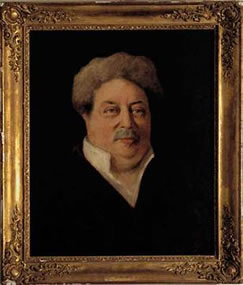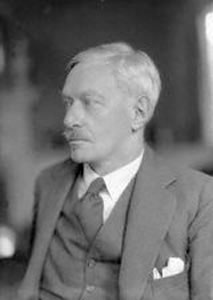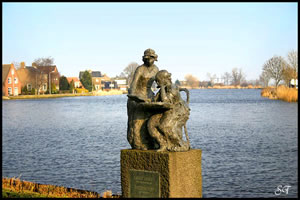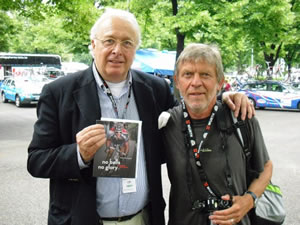De Franse dramaturg en schrijver Alexandre Dumas père werd geboren in (Villers-Cotterêts (Aisne) op 24 juli 1802. Zie ook alle tags voor Alexandre Dumas père op dit blog.
Uit: The Three Musketeers (Vertaald doorWilliam Barrow)
“In those times panics were common, and few days passed without some city or other registering in its archives an event of this kind. There were nobles, who made war against each other; there was the king, who made war against the cardinal; there was Spain, which made war against the king. Then, in addition to these concealed or public, secret or open wars, there were robbers, mendicants, Huguenots, wolves, and scoundrels, who made war upon everybody. The citizens always took up arms readily against thieves, wolves or scoundrels, often against nobles or Huguenots, sometimes against the king, but never against cardinal or Spain. It resulted, then, from this habit that on the said first Monday of April, 1625, the citizens, on hearing the clamor, and seeing neither the red-and-yellow standard nor the livery of the Duc de Richelieu, rushed toward the hostel of the Jolly Miller. When arrived there, the cause of the hubbub was apparent to all.
A young man–we can sketch his portrait at a dash. Imagine to yourself a Don Quixote of eighteen; a Don Quixote without his corselet, without his coat of mail, without his cuisses; a Don Quixote clothed in a woolen doublet, the blue color of which had faded into a nameless shade between lees of wine and a heavenly azure; face long and brown; high cheek bones, a sign of sagacity; the maxillary muscles enormously developed, an infallible sign by which a Gascon may always be detected, even without his cap–and our young man wore a cap set off with a sort of feather; the eye open and intelligent; the nose hooked, but finely chiseled. Too big for a youth, too small for a grown man, an experienced eye might have taken him for a farmer’s son upon a journey had it not been for the long sword which, dangling from a leather baldric, hit against the calves of its owner as he walked, and against the rough side of his steed when he was on horseback.”

Portret door Ernestine Philippain
De Engelse schrijver E. F. Benson werd geboren in Berkshire op 24 juli 1867. Zie ook alle tags voor E. F. Benson.
Uit: Trouble for Lucia
“Those are trophies of yours at Grebe, then,” said Miss Leg. “I consider tiger shooting a manly pursuit. That’s what I mean by sport, taking your life in your hand instead of sitting in an armchair and firing into flocks of hand-reared pheasants. That kind of ‘sportsman’ doesn’t even load his own gun, I believe. Butchers and poulterers; that’s what I called thim in one of my books.”
“Withering! Scathing!” cried Elizabeth. “And how well deserved. Benjy gave such a wonderful lecture here the other day about his hairbreadth escapes. You could have heard a pin drop.”
“Ah, that’s an old story now,” said Benjy. “My shikari days are over. And there’s not a man in Tilling who’s even seen a tiger except through the bars at the Zoo. Georgie Pillson, for instance–“
“Whom I presented to you at tea yesterday, Miss Leg,” put in Elizabeth. “Husband of our dear Mayor. Pointed beard. Sketches quite prettily, and does exquisite needlework. My wicked Benjy once dubbed him Miss Milliner Michael-Angelo.”

De Nederlandse schrijfster Betje Wolff (eig. Elizabeth Bekker) werd geboren in Vlissingen op 24 juli 1738. Zie ook alle tags voor Betje Wolff op dit blog.
De eerlyke bedelaar
Wys: Ce n’est que dans le retraite.
Wensch ik beedelend te leven?
Neen zo laag ben ik nog niet!
Schoon gy my hier beedlen ziet,
Schoon ik smeek, wilt my wat geven,
Dank ik voor die gift met smart:
Zy doet my zeer aan ’t eerlyk hart.
Mogt ik voor myn kostje wroeten,
Slooven, wurmen, dag en nagt!
‘k Heb de luiheid steeds veracht,
Dit zou nog myn ramp verzoeten!
‘Werkt dan’, roept er een vergramt,
Goed, myn vriend; maar ik ben verlamt!
De verstandige aandoening.
Wys: Contente, je chante.
‘k Ontdek wat, en is dat
Niet iets schoons, en een schat?
Ik lees iets, ’t geen ik bevat.
Deez schoone Roman is
Voor my ook gewis
Geschreven,
Gegeven,
Op dat ik in ’t weldoen niet mis.
Een kind geeft zyn goedje,
Aan een zieklyk bloedje,
En schreit om ’t geen hy verricht.
Wat is het verhe …… ven,
Ach, hoe behaagt my deeze pligt!

Beeld van Aagje Deken en Betje Wolff door Hans Bayens, Nes aan de Amstel
En bij het slotakkoord van de Tour de France:
De Belgische dichter en schrijver Willie Verhegghe werd op 22 juni 1947 te Denderleeuw geboren. Zie ook mijn blog van 22 juni 2011.
Maître Mart Smeets
Koers en woordsouplesse zitten bij hem ingebakken,
er draaien duizend wielen in zijn grijzend hoofd en
in de hitte van de Tour glinsteren zijn ogen
als wentelende spaken onder een Pyreneeënzon.
Hij is een te hoge boom in deze Lage Landen,
alle wind van Holland waait hem tegemoet
en zit hem zelfs op de huid tot ver over de grenzen.
Maar niets kan deze Gulliver doen buigen.
Mart haalt uit renners wat veel anderen
zelfs niet vermoeden dat het er is:
een stuk ziel, een flard verdriet en pijn
maar ook de torenhoge jubel om de zege.
Ik ken zijn bewondering voor Lance,
daarin zijn wij onbuigzame brothers in arms,
laatst stonden we in Lugano nog zij aan zij en
stralend naar de zich opwarmende Boss te kijken.
Kijk ook hoe hij tussen de renners wandelt,
neen: schrijdt, als opgepoetste spiegel van zijn klasse.
In deze man zit zowaar de grandeur van grote wijnen,
spreken doet hij steeds met zilver in de woorden.
Of hij hanteert het discrete goud van de stilte
wanneer ware emoties op zijn lippen bloeien
en hij plots een man wordt van vlees en bloed.
Met als het even kan een zingende Dalida op de schoot.

Hier met Mart Smeets (links)
